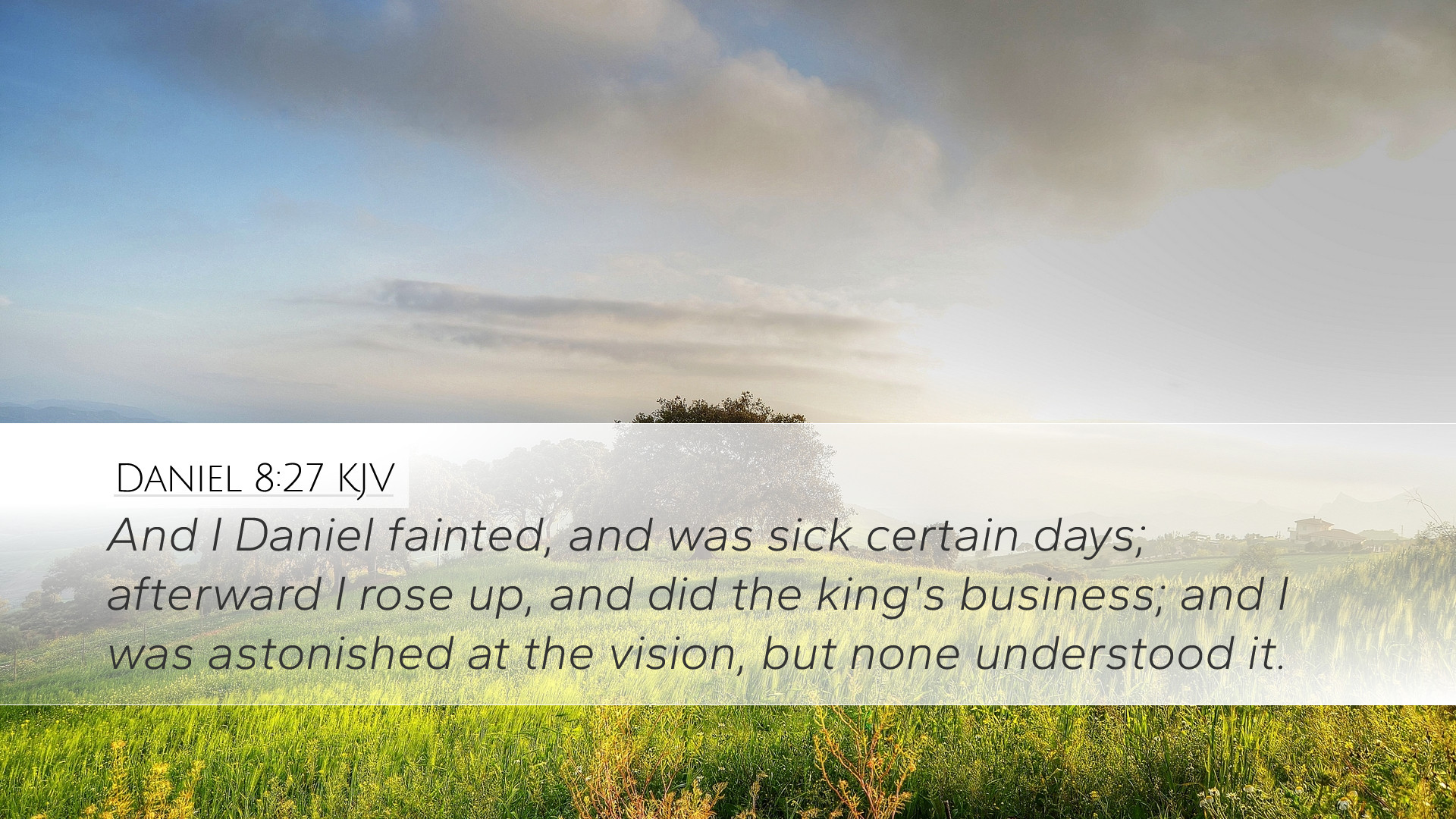Commentary on Daniel 8:27
Verse Text: "And I, Daniel, fainted, and was sick certain days; afterward I rose up, and did the king’s business; and I was astonished at the vision, but none understood it."
Introduction
Daniel 8:27 serves as a poignant conclusion to the vision of the ram and the goat, presenting a moment of personal struggle for the prophet Daniel. Here we witness Daniel grappling with the overwhelming nature of the revelations he receives, illustrating the deep emotional and spiritual burden that accompanies divine insight.
Matthew Henry's Commentary
Matthew Henry notes that Daniel's fainting represents the natural human reaction to the overwhelming knowledge of what is to come. His physical sickness shows the profound emotional impact this revelation has on him, as he is confronted with the realities of God’s plan for His people.
In particular, Henry emphasizes that the vision is not merely a history lesson but carries theological implications related to God’s sovereignty and the future of Israel. Daniel’s astonishment points to the depth of his comprehension; it is not enough to simply see the vision; its implications require deep meditation and understanding.
Albert Barnes' Commentary
Albert Barnes elaborates on the significance of Daniel's reaction. He asserts that the prophet’s astonishment indicates the gravity of the revelation concerning future empires and the suffering that God's people would endure. This reflects Barnes’ view that while the prophecies reveal God's ultimate control over history, they also speak to the hardships that believers face in the temporal world.
Furthermore, Barnes highlights that Daniel's commitment to "the king's business" post-vision provides an important lesson in faithfulness amidst struggle. Even when faced with the burden of prophecy, Daniel embodies a servant of God who continues to fulfill his earthly duties, demonstrating a balance between divine revelation and human responsibility.
Adam Clarke's Commentary
Adam Clarke delves into the psychological impact of prophetic visions on the prophet. His commentary indicates that Daniel experienced both a spiritual awakening and a physical response to the daunting revelations concerning the future of Israel and the Gentile nations. Clarke notes that such experiences can lead to a period of silence and introspection, a necessary time to process what has been revealed.
Clarke further stresses that Daniel’s astonishment reveals the ineffable nature of divine truths. He points out that despite Daniel's deep insight, there were aspects of the vision that "none understood," signifying the limitations of human understanding in the face of divine prophecy. This aspect encourages scholars and students to approach Scripture with humility, recognizing the vastness of God's plans beyond human comprehension.
Theological Implications
This verse illustrates key theological themes relevant to pastors and scholars alike:
- Divine Sovereignty: The narrative underscores God's supreme authority over history, as seen in the prophetic visions that depict the rise and fall of empires.
- The Burden of Revelation: Daniel's fainting serves as a metaphor for the profound weight of divine revelation that often accompanies prophetic insight.
- Human Limitation: The phrase "but none understood it" emphasizes the limits of human understanding in interpreting divine mysteries, encouraging a posture of reverence and inquiry.
Practical Applications
For pastors and theologians, Daniel 8:27 challenges the reader to reflect on the nature of prophetic insight and its implications for ministry:
- This verse invites believers to consider how they respond to challenging or complex revelations from God, advocating for a balanced life that fulfills secular responsibilities while engaging faithfully with spiritual truths.
- It serves as a reminder to be sensitive to the emotional responses associated with spiritual gifts, acknowledging that receiving profound truths may require processing time and support from the faith community.
- Finally, it encourages a humble approach to Scripture, urging scholars to recognize their limitations in understanding the full breadth of God’s plans.
Conclusion
In summary, Daniel 8:27 encapsulates a moment rich with implications for understanding divine prophecy, human emotion, and the call to faithful service. The insights from public domain commentaries resonate deeply with contemporary readers, urging them to grapple sincerely with the realities of their faith and the expansive nature of God's plans for humanity.


